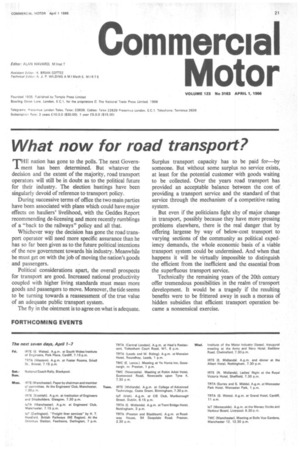What now for road transport?
Page 23

If you've noticed an error in this article please click here to report it so we can fix it.
THE nation has gone to the polls. The next Government has been determined. But whatever the decision and the extent of the majority, road transport operators will still be in doubt as to the political future for their industry. The election hustings have been singularly devoid of reference to transport policy.
During successive terms of office the two main parties have been associated with plans which could have major effects on hauliers' livelihood, with the Geddes Report recommending de-licensing and more recently rumblings of a "back to the railways" policy and all that.
Whichever way the decision has gone the road transport operator will need more specific assurance than he has so far been given as to the future political intentions of the new government towards his industry. Meanwhile he must get on with the job of moving the nation's goods and passengers.
Political considerations apart, the overall prospects for transport are good. Increased national productivity coupled with higher living standards must mean more goods and passengers to move. Moreover, the tide seems to be turning towards a reassessment of the true value of an adequate public transport system.
The fly in the ointment is to agree on what is adequate. Surplus transport capacity has to be paid for—by someone. But without some surplus no service exists, at least for the potential customer with goods waiting to be collected, Over the years road transport has provided an acceptable balance between the cost of providing a transport service and the standard of that service through the mechanism of a competitive rating system.
But even if the politicians fight shy of major change in transport, possibly because they have more pressing problems elsewhere, there is the real danger that by offering largesse by way of below-cost transport to varying sections of the community as political expediency demands, the whole economic basis of a viable transport system could be undermined. And when that happens it will be virtually impossible to distinguish the efficient from the inefficient and the essential from the superfluous transport service.
Technically the remaining years of the 20th century offer tremendous possibilities in the realm of transport development. It would be a tragedy if the resulting benefits were to be frittered away in such a morass of hidden subsidies that efficient transport operation became a nonsensical exercise.




















































































































